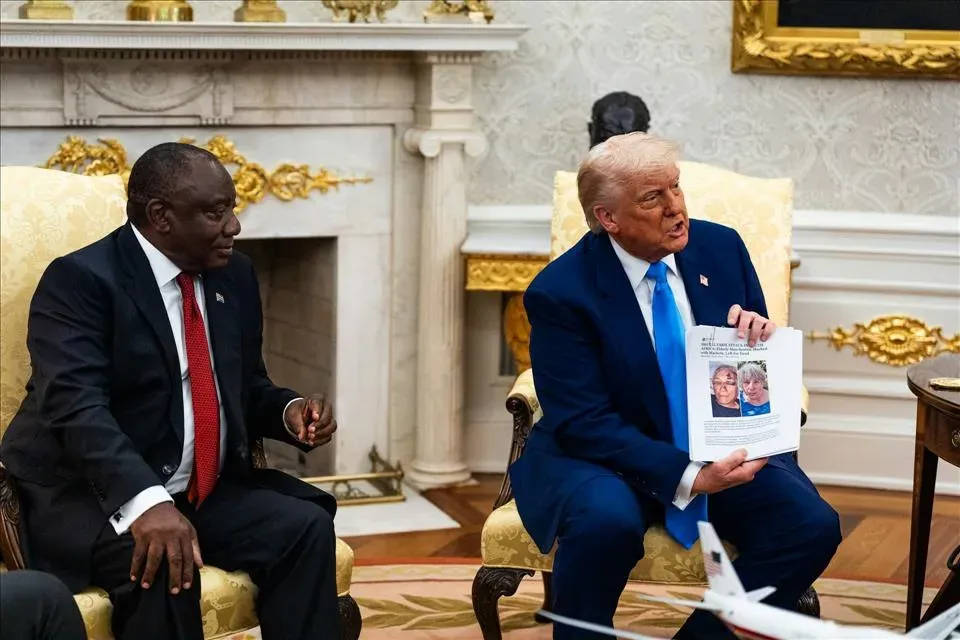
Henke Pistorius Claims ‘White Genocide’ Targets South African Farmers Amid Controversy
In a recent interview on *Piers Morgan Uncensored*, Henke Pistorius, the father of Oscar Pistorius, claimed there is a targeted “white genocide” against white farmers in South Africa. This assertion gained attention following discussions between South African President Cyril Ramaphosa and former US President Donald Trump regarding the safety of farmers. Henke expressed concern for the vulnerability of white farmers, emphasizing alarming murder statistics while challenging official police data.
Henke Pistorius voiced serious concerns during his interview about the safety of white farmers in South Africa, alleging that they face systemic targeting. Defending his position, he pointed out that while official statistics report a high murder rate, only a fraction of those deaths involve farmers, suggesting underreporting of violence against them. This controversy coincides with ongoing debates about land reform and racial tensions in the country.
The conversation between Henke Pistorius and Piers Morgan brought to light the fraught dynamics between crime statistics and personal experiences of violence among farmers. Henke’s insistence on seeking out alternative data sources like Afriforum highlights a broader distrust in official narratives surrounding crime in South Africa. This skepticism reveals the contentious atmosphere where farmers and government officials struggle to find a common ground on issues of safety and justice.
Amidst the revelations about the challenges he faced with his son, Oscar, Henke Pistorius reflected on their strained relationship shaped by Oscar’s infamous past. Henke expressed that their differing views on the justice system’s treatment of Oscar, who was convicted of murder in the death of Reeva Steenkamp, have created a disconnect. His comments illustrate the personal impact of national debates over race, justice, and the treatment of white communities in South Africa.
The history of violence in South Africa is deeply intertwined with the country’s socio-political landscape, especially regarding racial dynamics. Henke’s claims about genocide against white farmers raise critical questions about the realities of farm murders versus the narratives presented in media and politics. As families and communities are affected by crime, the conversation continues to evolve, highlighting the need for accurate statistics and compassionate dialogue around these sensitive topics.
Claims of Targeted Violence Against White Farmers
Henke Pistorius has alleged that white farmers in South Africa are targeted, asserting urgent concerns regarding their safety. He remarked, “Unfortunately, no farmer is in a position that they can rely on protection from authorities.”
During the discussion, Pistorius emphasized the need to consider murder statistics among white farmers, stating, “You just have to look at the figures and compare the figures of murders amongst white farmers with any group internationally.”
Despite these claims, South African police statistics indicate that out of 26,000 murders, only 44 involved farmers. This stark contrast raises questions about the validity of alleged targeted violence.
Disputes Over Crime Statistics
Henke Pistorius disputed the crime statistics provided by South African authorities, suggesting that these figures may not accurately reflect the dangers faced by white farmers. He urged reliance on organizations for better accuracy.
During his interview, Pistorius noted that organizations like Afriforum could provide more credible information. He is critical of official reports that minimize the issue of farm-related violence.
This debate around statistics underscores the complexities of crime reporting in South Africa, highlighting varying interpretations of data related to violence in farming communities.
Henke Pistorius’s claims of a targeted “white genocide” against farmers in South Africa raise critical debates on race relations and crime statistics in the country. However, the stark disparity in murder figures reveals complexities that challenge blanket assertions, warranting a cautious examination.
While Henke’s perspectives on white farmers being targeted echo certain fears, it’s essential to analyze the broader context of crime in South Africa, particularly against the backdrop of differing statistics and societal dynamics. Simplistic conclusions may ignore vital complexities.
Henke Pistorius’s statements reflect deep-seated concerns among some white communities in South Africa. However, engaging in a more nuanced dialogue that considers comprehensive crime data and community experiences is crucial for understanding the real issues at hand.
Let us know your thoughts by leaving a comment below!
Don’t forget to share this article with others who may find it helpful.






